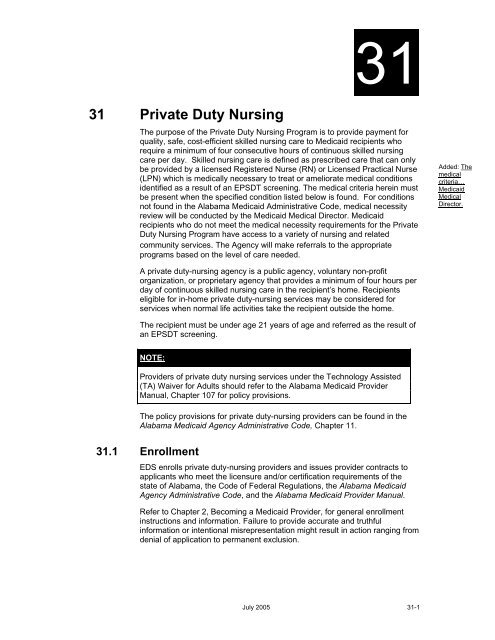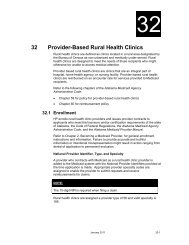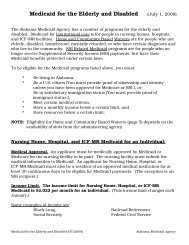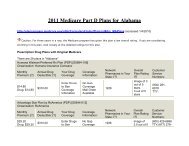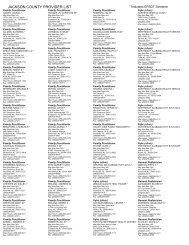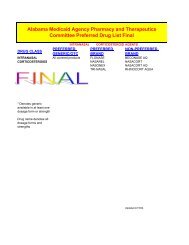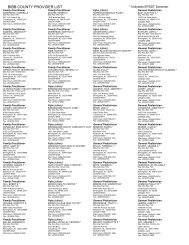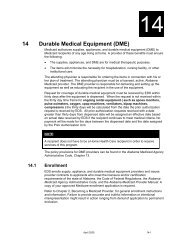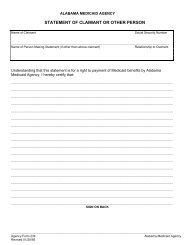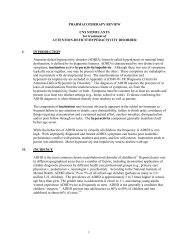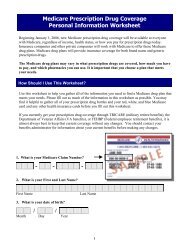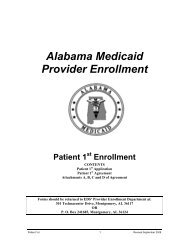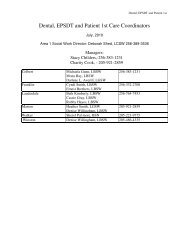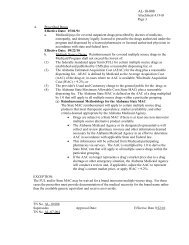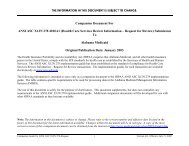Chapter 31 Private Duty Nursing
Chapter 31 Private Duty Nursing
Chapter 31 Private Duty Nursing
Create successful ePaper yourself
Turn your PDF publications into a flip-book with our unique Google optimized e-Paper software.
<strong>31</strong><br />
<strong>31</strong> <strong>Private</strong> <strong>Duty</strong> <strong>Nursing</strong><br />
The purpose of the <strong>Private</strong> <strong>Duty</strong> <strong>Nursing</strong> Program is to provide payment for<br />
quality, safe, cost-efficient skilled nursing care to Medicaid recipients who<br />
require a minimum of four consecutive hours of continuous skilled nursing<br />
care per day. Skilled nursing care is defined as prescribed care that can only<br />
be provided by a licensed Registered Nurse (RN) or Licensed Practical Nurse<br />
(LPN) which is medically necessary to treat or ameliorate medical conditions<br />
identified as a result of an EPSDT screening. The medical criteria herein must<br />
be present when the specified condition listed below is found. For conditions<br />
not found in the Alabama Medicaid Administrative Code, medical necessity<br />
review will be conducted by the Medicaid Medical Director. Medicaid<br />
recipients who do not meet the medical necessity requirements for the <strong>Private</strong><br />
<strong>Duty</strong> <strong>Nursing</strong> Program have access to a variety of nursing and related<br />
community services. The Agency will make referrals to the appropriate<br />
programs based on the level of care needed.<br />
Added: The<br />
medical<br />
criteria…<br />
Medicaid<br />
Medical<br />
Director.<br />
A private duty-nursing agency is a public agency, voluntary non-profit<br />
organization, or proprietary agency that provides a minimum of four hours per<br />
day of continuous skilled nursing care in the recipient’s home. Recipients<br />
eligible for in-home private duty-nursing services may be considered for<br />
services when normal life activities take the recipient outside the home.<br />
The recipient must be under age 21 years of age and referred as the result of<br />
an EPSDT screening.<br />
NOTE:<br />
Providers of private duty nursing services under the Technology Assisted<br />
(TA) Waiver for Adults should refer to the Alabama Medicaid Provider<br />
Manual, <strong>Chapter</strong> 107 for policy provisions.<br />
The policy provisions for private duty-nursing providers can be found in the<br />
Alabama Medicaid Agency Administrative Code, <strong>Chapter</strong> 11.<br />
<strong>31</strong>.1 Enrollment<br />
EDS enrolls private duty-nursing providers and issues provider contracts to<br />
applicants who meet the licensure and/or certification requirements of the<br />
state of Alabama, the Code of Federal Regulations, the Alabama Medicaid<br />
Agency Administrative Code, and the Alabama Medicaid Provider Manual.<br />
Refer to <strong>Chapter</strong> 2, Becoming a Medicaid Provider, for general enrollment<br />
instructions and information. Failure to provide accurate and truthful<br />
information or intentional misrepresentation might result in action ranging from<br />
denial of application to permanent exclusion.<br />
July 2005 <strong>31</strong>-1
<strong>Private</strong> <strong>Duty</strong> <strong>Nursing</strong><br />
Provider Number, Type, and Specialty<br />
A provider who contracts with Medicaid as a private duty-nursing provider is<br />
issued a eight-character Medicaid provider number that enables the provider<br />
to submit requests and receive reimbursements for nursing-related claims.<br />
NOTE:<br />
All eight characters are required when filing a claim.<br />
<strong>Private</strong> duty-nursing providers are assigned a provider type of 38 (<strong>Private</strong><br />
duty-nursing). The valid specialty is <strong>Private</strong> duty-nursing (P6).<br />
Enrollment Policy for <strong>Nursing</strong> Providers<br />
<strong>Private</strong> duty-nursing providers enroll as EPSDT only. Only in-state private<br />
duty-nursing providers and out-of-state providers within 30 miles of the state<br />
line qualify for participation in the Medicaid program. <strong>Private</strong> duty-nursing<br />
providers must have a RN on staff.<br />
<strong>31</strong>.2 Benefits and Limitations<br />
This section describes program-specific benefits and limitations. Refer to<br />
<strong>Chapter</strong> 3, Verifying Recipient Eligibility, for general benefit information and<br />
limitations.<br />
<strong>Nursing</strong> services must be prescribed as medically necessary by a licensed<br />
physician as a result of an EPSDT screening referral, based on the<br />
expectation that the recipient’s medical needs are adequately and safely met<br />
in the home.<br />
The EPSDT screening is valid for up to one year. If the need for services<br />
continues beyond the valid date, a new EPSDT screening is required.<br />
All private duty-nursing services require prior authorization. Additionally, the<br />
recipient must be under 21 years of age to qualify and must be Medicaid<br />
eligible. The recipient must require skilled nursing care which exceeds the<br />
caregiver’s ability to care for the recipient without the assistance of at least<br />
four consecutive hours of skilled nursing care.<br />
Qualified Caregiver<br />
Major commitment on the part of the recipient's family is mandatory to meet<br />
the recipient's needs. The primary caregiver must sign the <strong>Private</strong> <strong>Duty</strong><br />
<strong>Nursing</strong> Agreement for Care form agreeing to participate in and complete<br />
training. Additional caregivers identified for training must be indicated on the<br />
<strong>Private</strong> <strong>Duty</strong> <strong>Nursing</strong> Agreement for Care form. In the event that multiple<br />
caregivers exist, an adjustment in the hours approved for PDN will occur.<br />
• The family must have at least one member capable of and willing to be<br />
trained to assist in the provision of care for the recipient in the home.<br />
• The family must provide evidence of parental or family involvement, and<br />
an appropriate home situation (for example, a physical environment and<br />
geographic location for the recipient’s medical safety).<br />
<strong>31</strong>-2 July 2005
<strong>Private</strong> <strong>Duty</strong> <strong>Nursing</strong> <strong>31</strong><br />
• Reasonable plans for emergencies (such as power and equipment<br />
backup for those with life-support devices) and transportation must be<br />
established.<br />
Hours Allowed For Continuation of <strong>Private</strong> <strong>Duty</strong> <strong>Nursing</strong> Services Under<br />
the Following Circumstances:<br />
• Temporary Illness: <strong>Private</strong> <strong>Duty</strong> <strong>Nursing</strong> Hours may be provided if the<br />
primary caregiver is incapacitated for a period up to 90 days due to illness<br />
and there is no other trained caregiver available in the home. Temporary<br />
illness includes a required surgical procedure due to illness/disease, an<br />
illness which would be a danger to the child because of contagion, or an<br />
illness which is debilitating for a limited period. Medical documentation<br />
from the caregiver’s attending physician is required. The number of hours<br />
approved is dependent upon the specific circumstances.<br />
• Patient at Risk: <strong>Private</strong> duty nursing hours may be approved if the patient<br />
appears to be at risk of abuse, neglect, or exploitation in the domestic<br />
setting and a referral for investigation has been made to the appropriate<br />
state agency. The number of hours approved is dependent upon the<br />
specific circumstances.<br />
• Sleep: <strong>Private</strong> duty nursing hours may be provided up to eight hours<br />
depending on the situation of the primary care giver. For example, a<br />
single parent with no other family support may be granted a full eight<br />
hours while two parents serving as primary caregivers may require fewer<br />
hours or only hours on an occasional basis.<br />
• Work: <strong>Private</strong> duty nursing hours provided will be up to the number of<br />
hours that the primary caregiver is at work plus one hour travel time. If<br />
additional travel time is needed beyond one hour, documentation must be<br />
provided to justify the increase. A <strong>Private</strong> <strong>Duty</strong> <strong>Nursing</strong> Verification of<br />
Employment/School Attendance form providing documentation of work<br />
hours must be completed.<br />
• School: <strong>Private</strong> duty nursing hours provided will be up to the number of<br />
hours that the primary caregiver is attending class plus one hour travel<br />
time. If additional travel time is needed beyond one hour, documentation<br />
must be provided to justify the increase. A current course selection guide<br />
published by the school, validated class schedule from school, curriculum<br />
guide and transcripts of previous courses taken must be provided. The<br />
coursework must be consistent with the requirement for obtaining a GED,<br />
college degree, or some other type of certification for employment.<br />
Courses selected must follow a logical approach with class hours being<br />
taken one after the other unless the course has been indicated by school<br />
officials as “closed”.<br />
NOTE:<br />
The private duty-nursing program does not cover recipients receiving<br />
skilled nursing care through the home health program. <strong>Nursing</strong> care<br />
covered by Medicaid in both programs would result in duplicate<br />
reimbursements.<br />
July 2005 <strong>31</strong>-3
<strong>Private</strong> <strong>Duty</strong> <strong>Nursing</strong><br />
NOTE:<br />
Any private duty nursing hours approved will be reduced by the<br />
number of hours of care which are provided or are available from<br />
other resources. In the event a child eligible for Medicaid is already<br />
attending or plans to attend public school, the case manager should<br />
contact the Special Education Coordinator within the appropriate school<br />
district to request that the child’s Individual Education Program (IEP)<br />
committee meet to determine the student’s need for related services. The<br />
names and contact information for the coordinators are on the education<br />
website at www.alsde.edu. The Individuals with Disabilities Education Act<br />
(IDEA) guarantees every child the right to a free, appropriate public<br />
education and related services in the least restrictive environment. The<br />
case manager may be asked to be part of the client’s IEP team to<br />
facilitate the coordination of necessary related services. Related services<br />
needed in the school that are the same as services provided in the home<br />
should be closely coordinated. For example, a child needing nursing<br />
services should be evaluated and recommended for the appropriate level<br />
of care to ensure no break in services if services previously provided by<br />
Medicaid are subsequently provided by the school district. For children<br />
attending public school, the number of approved hours may be modified<br />
during the summer months and school breaks.<br />
<strong>31</strong>.2.1 Criteria for Non-Ventilator-Dependent Recipients<br />
High technology non-ventilator-dependent recipients may qualify for private<br />
duty-nursing services if they meet either of the following criteria and at least<br />
one qualified caregiver has been identified:<br />
Added: Primary<br />
requisites<br />
include…the<br />
following as<br />
Deleted: The<br />
following primary<br />
requisites are<br />
Added: An additional<br />
period…for<br />
continuing therapy.<br />
• Any one of the primary requisites is present.<br />
• Two or more secondary requisites are present.<br />
Primary Requisites<br />
Primary requisites include, but may not be limited to, the following as<br />
qualifying criteria for nursing recipients:<br />
• Tracheotomy - Coverage up to four months for acute (new) tracheotomy<br />
with up to an additional two months with documentation of continuing<br />
acute problems. Continuation of nursing services may be approved after<br />
initial certification for those periods of time when the primary caregiver is<br />
away from the home for work or school or otherwise unable to provide the<br />
necessary care.<br />
• Total Parenteral Nutrition (TPN) - Coverage up to two months for acute<br />
phase with additional certification based upon the need for continuing<br />
therapy<br />
• Intravenous Therapy - Coverage up to two months for a single episode.<br />
The number of hours required for a single infusion must be at least four<br />
continuous hours and require monitoring and treatment by a skilled nurse.<br />
An additional period of certification may be approved based on medical<br />
necessity for continuing therapy. Additional hours may also be approved<br />
for secondary criteria requisites listed below in conjunction with the<br />
primary criteria requisites.<br />
<strong>31</strong>-4 July 2005
<strong>Private</strong> <strong>Duty</strong> <strong>Nursing</strong> <strong>31</strong><br />
Secondary Requisites<br />
Secondary requisites include, but may not be limited to the following as<br />
qualifying criteria for nursing recipients:<br />
• Decubitus ulcers - coverage for stage three or four ulcers<br />
• Colostomy or ileostomy care - coverage for new or problematic cases<br />
• Suprapubic catheter care - coverage for new or problematic cases<br />
• Internal nasogastric or gastrostomy feedings - coverage for new or<br />
problematic cases<br />
<strong>31</strong>.2.2 Criteria for Ventilator-Dependent Recipients<br />
Ventilator dependent recipients may qualify for private duty-nursing services if<br />
any one of the primary requisites is present and at least one qualified<br />
caregiver has been identified.<br />
Primary Requisites<br />
Primary requisites include, but may not be limited to the following as qualifying<br />
criteria for nursing recipients:<br />
• Mechanical ventilator support is necessary for at least six hours per day<br />
and appropriate weaning steps are in progress on a continuing basis.<br />
• Frequent ventilator checks are necessary. Frequent ventilator checks are<br />
defined as daytime versus nighttime setting changes, weaning in<br />
progress, or parameter checks a minimum of every eight hours with<br />
subsequent ventilator setting changes.<br />
• Oxygen supplementation for ventilator dependent recipients is at or below<br />
an inspired fraction of 40 percent (Fi02 of 0.40).<br />
Deleted: Any<br />
two<br />
secondary…for<br />
nursing<br />
recipients<br />
Added:<br />
Secondary<br />
requisites<br />
include…for<br />
nursing<br />
recipients:<br />
Added: Primary<br />
requisites<br />
include,…for<br />
nursing<br />
recipients<br />
Deleted: Any of<br />
the…for nursing<br />
recipients:<br />
Added:<br />
appropriate<br />
weaning<br />
steps…a<br />
continuing<br />
basis.<br />
Deleted:<br />
attempted<br />
weaning…at<br />
least weekly.<br />
<strong>31</strong>.2.3 Scope of Services<br />
This section lists the scope of services provided by professional nurses and<br />
licensed practical nurses.<br />
Registered Nurse Services (RN)<br />
A registered nurse employed by a Medicaid-enrolled private duty-nursing<br />
agency may provide continuous skilled nursing services to the recipient if a<br />
licensed physician prescribes the services and Medicaid grants prior<br />
authorization.<br />
The RN completes an in-home assessment to determine if services may be<br />
safely and effectively administered in the home. The registered nurse<br />
establishes a nursing care plan complying with the plan of treatment.<br />
The RN must make monthly supervisory visits to evaluate the<br />
appropriateness of services rendered by a licensed practical nurse (LPN). An<br />
RN must be on call 24 hours a day, seven days a week.<br />
July 2005 <strong>31</strong>-5
<strong>Private</strong> <strong>Duty</strong> <strong>Nursing</strong><br />
Licensed Practical Nurse Services (LPN)<br />
The LPN may provide continuous skilled nursing services for the recipient if a<br />
licensed physician prescribes the services and Medicaid grants prior<br />
authorization. The LPN works under the supervision of the RN.<br />
The RN evaluates the recipient and establishes the plan of care prior to<br />
assigning recipient services to the LPN.<br />
The Medicaid program requires that the RN on a monthly basis provides<br />
direct or indirect supervisory visits of the LPN in the home of each recipient<br />
the LPN serves. Direct supervisory visits are made by the RN to observe the<br />
appropriateness of LPN services when the LPN is present. Indirect<br />
supervisory visits are made by the RN to observe the appropriateness of LPN<br />
services when the LPN is not present.<br />
<strong>31</strong>.2.4 Documentation of Services<br />
The private duty-nursing agency is responsible for establishing and<br />
maintaining a permanent medical record for each recipient including the<br />
following:<br />
• Home Health Certification and Plan of Care form (CMS-485) for<br />
certification and re-certification signed by the physician<br />
• Medical Update and Patient Information form (CMS-486) signed by the<br />
physician<br />
• <strong>Private</strong> duty-nursing Acceptance form<br />
• EPSDT Referral for Services form (Form 167) or Patient 1 st EPSDT<br />
Referral for Services (Form 345)<br />
• Any additional physician orders<br />
• Signature log with dates, duration of visits, types of service, and signature<br />
of the RN/LPN and the caregiver (a copy must be provided to the<br />
recipient or recipient’s representative).<br />
• Continuous progress reports<br />
• Documentation of in-home RN visits to supervise the LPN<br />
Medical records shall be retained for at least three years plus the current<br />
year.<br />
Plan of Care<br />
A plan of care must be developed and submitted with each request for<br />
service documenting the extent of nursing needs. Each professional<br />
participating in the recipient's care must carefully review the recipient's<br />
status and needs. Each discipline must formulate goals and objectives for<br />
the recipient and develop daily program components to meet these goals in<br />
the home. This plan must also include the following:<br />
• Designation of a home care service coordinator<br />
<strong>31</strong>-6 July 2005
<strong>Private</strong> <strong>Duty</strong> <strong>Nursing</strong> <strong>31</strong><br />
• Involvement of a primary care physician with specific physician orders for<br />
medications, treatments, medical follow-up, and medical tests as<br />
appropriate<br />
• Family access to a telephone<br />
• A plan for monitoring and adjusting the home care plan<br />
• A defined backup system for medical emergencies<br />
• A plan to meet the educational needs of the recipient<br />
• A clearly shown planned reduction of private duty hours<br />
• Criteria and procedures for transition from private duty-nursing care, when<br />
appropriate<br />
At each certification, the care plan will be denied, approved, or returned to<br />
request additional information. The recipient should transition to the most<br />
appropriate care when the recipient no longer meets the private duty-nursing<br />
criteria. The most appropriate care may be home care services, nursing<br />
facility placement, or the Home and Community Based Waiver Program.<br />
<strong>31</strong>.2.5 Non-Covered <strong>Private</strong> <strong>Duty</strong> <strong>Nursing</strong> Services<br />
When the recipient does not meet the medical need and diagnosis criteria or<br />
does not require at least four consecutive hours of continuous skilled nursing<br />
care per day, Medicaid will not cover private duty-nursing services.<br />
Medicaid does not provide private duty-nursing services under the following<br />
circumstances:<br />
• Observational care for behavioral, eating disorders, or for medical<br />
conditions that do not require medically necessary intervention by skilled<br />
nursing personnel<br />
• Services not prescribed to treat or improve a condition identified as a<br />
result of an EPSDT screening<br />
• Custodial, sitter, and respite services<br />
• Services after the recipient is admitted to a hospital or a nursing facility<br />
• Services after the recipient is no longer eligible for Medicaid<br />
If the provider fails to comply with agency rules and program policies,<br />
Medicaid may recoup payments and terminate the provider contract.<br />
Please refer to the Alabama Medicaid Agency Administrative Code, <strong>Chapter</strong><br />
11, for detailed policy information.<br />
July 2005 <strong>31</strong>-7
<strong>Private</strong> <strong>Duty</strong> <strong>Nursing</strong><br />
<strong>31</strong>.3 Prior Authorization and Referral Requirements<br />
All private duty-nursing services require prior authorization. Refer to <strong>Chapter</strong><br />
4, Obtaining Prior Authorization, for general guidelines.<br />
<strong>Private</strong> duty-nursing providers are required to submit to EDS the following<br />
forms for consideration of authorization for services:<br />
• Alabama Prior Review and Authorization Request form<br />
• EPSDT Referral for Services form (Form 167) or Patient 1 st EPSDT<br />
Referral for Services form (Form 345)<br />
• Home Health Certification and Plan of Care form (CMS-485) for<br />
certification and recertification signed by the physician.<br />
• Medical update and Patient Information form (CMS-486) signed by the<br />
physician<br />
• <strong>Private</strong> duty-nursing Acceptance form<br />
• Any additional physician orders<br />
When filing claims for recipients enrolled in the Patient 1 st Program, refer to<br />
<strong>Chapter</strong> 39, Patient 1 st Billing Manual to determine whether your services<br />
require a referral from the Primary Medical Provider (PMP).<br />
The EPSDT Referral for Services form (Form 167) or Patient 1 st EPSDT<br />
Referral for Services form (Form 345) is valid for one year from date of<br />
screening. If the recipient continues to be approved for services beyond the<br />
one year screening date, a new EPSDT Referral for Services form (Form 167)<br />
or Patient 1 st EPSDT Referral for Services form (Form 345) indicating the<br />
current screening date and appropriate information must be submitted.<br />
Re-certification<br />
Every three months, documentation must be submitted to EDS to support the<br />
need for continuation of private duty-nursing services. Providers must submit<br />
re-certification requests to EDS at least 14 days prior to the re-certification<br />
due date. Re-certifications not received timely will be approved when criteria<br />
are met based on date of receipt. The request for re-certification will be<br />
approved or denied based on Medicaid criteria. EDS denies claims for<br />
services rendered after the cancellation date.<br />
<strong>31</strong>.4 Cost Sharing (Copayment)<br />
Copayment does not apply to services provided by private duty-nursing<br />
providers.<br />
<strong>31</strong>-8 July 2005
<strong>Private</strong> <strong>Duty</strong> <strong>Nursing</strong> <strong>31</strong><br />
<strong>31</strong>.5 Completing the Claim Form<br />
To enhance the effectiveness and efficiency of Medicaid processing,<br />
providers are encouraged to bill Medicaid claims electronically.<br />
<strong>Private</strong> duty-nursing providers who bill Medicaid claims electronically receive<br />
the following benefits:<br />
• Quicker claim processing turnaround<br />
• Immediate claim correction<br />
• Enhanced online adjustment functions<br />
• Improved access to eligibility information<br />
Refer to Appendix B, Electronic Media Claims Guidelines, for more<br />
information about electronic filing.<br />
‣ Electronic<br />
claims<br />
submission<br />
can save<br />
you time and<br />
money. The<br />
system<br />
alerts you to<br />
common<br />
errors and<br />
allows you to<br />
correct and<br />
resubmit<br />
claims<br />
online.<br />
NOTE:<br />
When filing a claim on paper, a UB-92 claim form is required. When<br />
completing the UB-92, enter type of bill 3<strong>31</strong>. Medicare-related claims must<br />
be filed using the Institutional Medicaid/Medicare Related Claim Form.<br />
This section describes program-specific claims information. Refer to <strong>Chapter</strong><br />
5, Filing Claims, for general claims filing information and instructions.<br />
<strong>31</strong>.5.1 Time Limit For Filing Claims<br />
Medicaid requires all claims for private duty nurse providers to be filed within<br />
one year of the date of service. Refer to Section 5.1.5, Filing Limits, for more<br />
information regarding timely filing limits and exceptions.<br />
<strong>31</strong>.5.2 Diagnosis Codes<br />
The International Classification of Diseases - 9th Revision - Clinical<br />
Modification (ICD-9-CM) manual lists required diagnosis codes. These<br />
manuals may be obtained by contacting the American Medical Association,<br />
P.O. Box 10950, Chicago, IL 60610.<br />
NOTE:<br />
ICD-9 diagnosis codes must be listed to the highest number of digits<br />
possible (3, 4, or 5 digits). Do not use decimal points in the diagnosis<br />
code field.<br />
July 2005 <strong>31</strong>-9
<strong>Private</strong> <strong>Duty</strong> <strong>Nursing</strong><br />
<strong>31</strong>.5.3 Procedure Codes<br />
<strong>Private</strong> duty nurse providers use the Current Procedural Terminology (CPT)<br />
coding system. The CPT manual lists most Medicaid required procedure<br />
codes. This manual may be obtained by contacting the Order Department,<br />
American Medical Association, 515 North State Street, Chicago, IL 60610-<br />
9986.<br />
The following revenue codes and procedure codes apply when filing claims<br />
for private duty-nursing services:<br />
Revenue Code Procedure Code Description<br />
551 S9123/Modifier EP <strong>Private</strong> <strong>Duty</strong> Nurse/RN<br />
551 S9124/Modifier EP <strong>Private</strong> <strong>Duty</strong> Nurse/LPN<br />
<strong>31</strong>.5.4 Place of Service Codes<br />
Place of services codes do not apply when filing the UB-92 claim form.<br />
<strong>31</strong>.5.5 Required Attachments<br />
To enhance the effectiveness and efficiency of Medicaid processing, your<br />
attachments should be limited to the following:<br />
• Claims With Third Party Denials<br />
NOTE:<br />
When an attachment is required, a hard copy UB-92 claim form must be<br />
submitted.<br />
Refer to Section 5.7, Required Attachments, for more details about these<br />
attachments.<br />
<strong>31</strong>.6 For More Information<br />
This section contains a cross-reference to other relevant sections in the<br />
manual.<br />
Resource<br />
Where to Find it<br />
UB-92 Claim Filing Instructions Section 5.3<br />
Institutional Medicaid/Medicare-related Claim Section 5.7.2<br />
Filing Instructions<br />
Electronic Media Claims (EMC) Submission Appendix B<br />
Guidelines<br />
AVRS Quick Reference Guide<br />
Appendix L<br />
Alabama Medicaid Contact Information<br />
Appendix N<br />
<strong>31</strong>-10 July 2005
<strong>Private</strong> <strong>Duty</strong> <strong>Nursing</strong> <strong>31</strong><br />
<strong>31</strong>.7 Local Code Crosswalk Information<br />
NOTE:<br />
Use “Local” procedure codes for dates of service through 12/<strong>31</strong>/03. Use<br />
HCPCS procedure code, with modifier(s) if applicable, for dates of service<br />
01/01/04 and thereafter.<br />
“Local” code<br />
thru 12/<strong>31</strong>/03<br />
HCPCS-Modifier(s)<br />
Beginning 01/01/04<br />
Description<br />
S9905 S9123-EP PDN-RN (EPSDT<br />
only, w/ PA)<br />
S9905 S9123-U5 PDN-RN (TA Waiver)<br />
S9908 S9124-U5 PDN-LPN (TA<br />
Waiver)<br />
S9908 S9124-EP PDN-LPN (EPSDT<br />
only, w/ PA)<br />
July 2005 <strong>31</strong>-11
<strong>Private</strong> <strong>Duty</strong> <strong>Nursing</strong><br />
This page is intentionally left blank.<br />
<strong>31</strong>-12 July 2005


